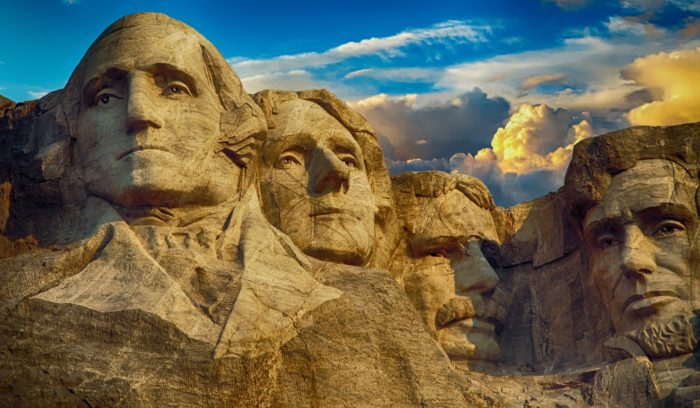From The Writers’ Tool Box: Honoring Men Of The Past
Today is designated as Presidents’ Day in the US. When I was in school, we celebrated Lincoln’s Birthday on February 12, followed by Washington’s Birthday on February 22. Only one of those was a national holiday that gave us a day off from school, as I recall.
Since then we have added a celebration of Martin Luther King on January 15, and I guess the powers that be thought a) the number of single day celebrations was getting out of hand and b) other Presidents, not just the first and the fifteenth, deserved to be commemorated. So we consolidated and now have the current Presidents’ Day.
I’m actually OK with that. Certainly Lincoln, who was the President of the US during the Civil War, and Washington, who was President during the Revolutionary War, were instrumental in the founding and preserving of our country. But other Presidents played memorable roles in our history as well, some in time of war, and some in time of peace.
The honoring of men of note and remembering our history as a nation, say a great deal about us.
And once again, I have to stop and think—what Great Men are remembered in the speculative stories I’ve read? What holidays and celebrations are there to preserve the history of a culture?
Too often it seems to me, fantasies and science fiction stories take place in imagined worlds that feel imagined because they lack a basis in the history of their world. People don’t have Leader’s Day or a Birth of the Nation day.
There may be cultural phenomena such as the Hunger Games and the events surrounding the choosing of contestants, or the assigning of young people to one of the factions in Divergent. But I don’t recall a feast day or a day off work when the whole nation celebrated their history.
Maybe the fault is mine and I simply am not remembering those existing aspects of the worldbuilding in recent speculative stories.
It seems to me that adding such days of commemoration or celebration add depth to the worldbuilding of any story. Certainly religion and politics and language and customs help to create the world in which a speculative story takes place.
But what about history?
 Shouldn’t there be statues to great men? Or museums? Or, at least, oral traditions telling of the history of the world?
Shouldn’t there be statues to great men? Or museums? Or, at least, oral traditions telling of the history of the world?
Shouldn’t there be national holidays commemorating the end of war or the beginning of the rule of a renowned leader?
It’s been a while since I read it, but I think George Orwell’s Animal Farm included some of these cultural traits that create a sense of world. For instance, after the animals revolt, they revere Old Major who was instrumental in starting the rebellion.
Of course in Orwell’s allegory, the history that once was celebrated slowly changes and becomes a tool for propaganda and an instrument to wield against dissent.
Celebrations and commemorations can certainly be used for wrong motives. But the point here is this: honoring historical figures and holding political or religious ceremonies are part of what a culture does.
When these things are missing from a speculative world, they may not detract from it, but they also don’t add the depth that including them would do.
I’ve written about holidays and celebrations before, largely highlighting ones that mirror or are borrowed from the real world. My thoughts this Presidents’ Day are more along the line of holidays and festivals unique to the speculative world. I mean, wouldn’t a space opera have experienced wars with other planetary systems, complete with heroes that were commemorated in song or story o statue?
Tolkien was good with the history of Middle Earth, often referring to stories and songs, and even at one point having one of his characters muse about the songs that might be written about him and his deeds.
For some, Tolkien’s Middle Earth story is passé. We’ve had knock-offs and look-alikes to the point that journey/quest fantasy has fallen out of favor. Regardless, we can hardly ignore the incredible depth of the world he created. The place feels real. A part of that comes from the celebration of the past and the passing down through story and song the events of note that turned people into heroes.
As I think about it, I conclude that one way to give a speculative world texture is to create a history the characters can celebrate. As Christian speculative writers strive to perfect the writing craft, I encourage a look at the worldbuilding, not as the most essential element in a story, but certainly one that can add a sense of reality and depth.
What do you think? Are contemporary Christian speculative novels well-grounded in a story world filled with appropriate cultural elements, including celebrations and commemorations?












































Lincoln was the 16th president. (Land of Lincoln resident here — state employees still get Lincoln’s birthday as a holiday, he kind of a big deal being a “local” lol.)
But I agree having holidays that focus on the past would add a lot of depth to a world.
I can’t think of any specific holidays off hand, but Anne Elisabeth Stengl was doing some great work with tying the past into her Goldstone Wood series . . . I miss those!
Many notable cultural things in fiction seem to focus more around events and landmarks in people’s lives, at least up to a point. Like, when characters finish their apprenticeships, their culture might have a sort of graduation event where they prove/show off their skills and then have a ceremony that gives them a new name, title, etc. So many events seem focused on things that characters do, which gives the story a chance to show how competent characters are, establish any rivalries, or be a backdrop for when the enemy decides to spoil their peace by invading.
There’s probably actually a pretty good amount of yearly feasts and holidays mentioned in fantasy, they just aren’t harped upon or considered as important to the plot, so maybe they’re harder to recall. One of the main event/holiday type things in something I’ve read lately is in The BlackBlood Alliance by Kay Fedewa. There’s a feast that the Inarian wolves hold each year when a primitive horse herd migrates back into their territory. But one reason it’s more memorable is because it matters to the plot. Like, for one thing, the wolves were eagerly awaiting the herd’s return so they didn’t have to be as hungry, so when the herd DIDN’T return, they felt desperate/angry/worried and whatever else. Which is probably going to play a very key point in the plot later.
As far as honoring specific people, that often seems to be handled more in stories passed down through generations, rather than specific holidays. At least in fantasy.